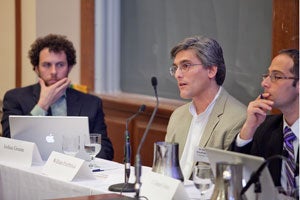Academics from the fields of law, neuroscience, psychology, philosophy, and economics convened at Harvard Law School April 15 and 16 to discuss the moral and legal dimensions of developments in neuroscience and evolutionary biology.
The conference—titled “Moral Biology: What (if anything) can the mind sciences and evolutionary biology tell us about law and morality?”— addressed these connections in a series of panels examining personal responsibility, criminal law, addiction, interpersonal cooperation, and racism.
Each panel brought together academics who addressed the issues from a variety of viewpoints. The “Addiction/Intervention Paradigm” panel, for example, featured scientist Rita Z. Goldstein of the Brookhaven National Laboratory; University of Virginia law professor Richard J. Bonnie; and Dr. Steven E. Hyman, Harvard University provost and professor of neurobiology at Harvard Medical School.
Hyman described medical and biological views of addiction as “running headlong into traditional Western views of morality: the notion that people freely form intentions, that people can act in accordance with their intentions, and that people can suppress responses to stimuli.”
He explained how drugs release dopamine in the brain and how that process is linked evolutionarily to survival–because the brain reacts to dopamine as an emotional reward. “It not only tells you the circumstances in the world where you get the reward, which is life-enhancing, it also begins to ingrain the motor programs that lead to obtaining the reward,” he said.
A lab rat will quickly learn to push a lever to get a drug and a human will remember how to rob a convenience store, Hyman observed.
Goldstein expanded on the scientific aspects of addiction, speaking of her research involving drug addiction and the interaction between the brain and behavior.
Bonnie turned the discussion to how greater understanding of the biology of addiction might help guide a proper legal response. He said that most discussions about legal responses to addiction focus on the issue of personal responsibility–that is, to what degree should addicts be punished for succumbing to an addiction over which they may have little control?
But Bonnie said he considers the issue of responsibility “a bit of a distraction, since resolving it one way or the other would not really have a substantial impact on the basic design of drug policy.”
He also said that adoption of the “excuse” argument by courts would be detrimental.
“It’s not worth the effort when compared with the benefits and lower adjudicative costs of doing basically what we are doing right now and should be doing with increasing frequency, which is: using a treatment-diversion model in order to divert people out of the criminal-justice system, using the leverage of the criminal-justice system to get them into treatment.”
The panel on “biology and cooperation” applied concepts of evolutionary biology in a broader manner to examine why people and groups cooperate with each other.
Kevin McCabe, a professor of economics and law at George Mason University, explained that social exchanges among humans are largely the result of evolutionary experience.
“A lot of what we would call social reasoning and social affect are various mechanisms that have evolved and that allow the brain to create longer-term goals,” he said.
David G. Rand, a post-doctoral fellow in mathematical biology at Harvard, described how humans learn the personal value of cooperation and how cultures evolve through norms. But he said the reason people learn to cooperate is quite simple: “The lesson from biology about ultimate causes of morality is that we are moral because it either was beneficial or is beneficial, both to us and to our society.”
Vermont Law School professor Oliver R. Goodenough carried the concept of cooperation a bit further, pointing to the evolutionary value of human friendship.
“Friendship is a mechanism that creates spaces of trust within which we expect to be treated right,” he said.
The conference also featured a “public panel debate” at which panelists responded to the broad question of the conference theme. The panel was moderated by assistant HLS professor I. Glenn Cohen, co-director of the Petrie-Flom Center for Health Law Policy, Biotechnology, and Bioethics, a co-sponsor of the conference.
William J. FitzPatrick, associate professor of philosophy at Virginia Tech University, criticized the argument that moral beliefs are “saturated with evolutionary influence.” He said the argument is “something I think we have no reason to accept unless we’ve already rejected the idea of independent, knowable moral truths.”
Dartmouth College assistant philosophy professor Adina L. Roskies also expressed concern that evolutionary science can lead to the conclusion that humans are not morally responsible for their actions because of biological determinism.
Science can create a sense that “we are mechanistic systems,” she said, “and it’s clear that there’s something about this notion of mechanism that is intuitively threatening to the idea of free will.”
